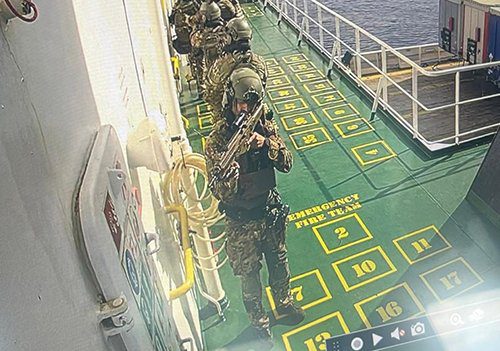
The spectre of piracy could be returning to European shores as Italian special forces successfully raided a vessel hijacked by 15 migrants Friday, June 9th, off the coast of Naples.
The raid occurred after a cargo ship sailing from Turkey to France was hijacked by stowaway migrants using knives, forcing authorities to mount a rescue operation using two navy helicopters.
Du liest von einem Vorfall im Mittelmeer, bei dem Syrer, Iraker und Afghanen versuchten, das türkische Schiff „Galata Seaways“ in der Nähe von Neapel zu kapern, weil ihnen missfiel, dass es einen Hafen in Frankreich und nicht Italien ansteuerte. pic.twitter.com/v2NWxMJQZH
— Jan A. Karon (@jannibal_) June 11, 2023
The incident was sparked after crew members discovered the migrants hidden aboard the vessel. The Italian Ministry of Defence so far has not released details of the nationalities of the men.
The vessel in question was a Turkish-registered cargo ship named Galata Seaways which was transporting cars from Turkey to the port town of Sete in southern France. The migrants were believed to be attempting to enter Europe illegally, a not uncommon occurrence these days, as Italy battles an influx of migrants arriving by boat from the Middle East and West Africa.
According to media reports the migrants attempted to take crewmembers hostage before authorities were alerted. The Italian navy promptly responded with special forces experiencing little resistance as they took control of the cargo ship which was subsequently taken to port in Naples.
🚨İtalyan Özel Kuvvetlerin yaptığı operasyonla, kaçak göçmenler tarafından ele geçirilen Türk bayraklı "Galata Seaways Gemisi"ndeki kaçak yolcular indirilerek gemi kurtarıldı. pic.twitter.com/5Q02fuCQzt
— Yekvücut (@yekvucutcom) June 10, 2023
While the men have yet to be formally charged, in Italian law, piracy carries a sentence of up to 20 years depending on the severity of the crime.
Examples of hijackings by migrants in the Mediterranean are not entirely uncommon. Similar incidents have occurred off the Libyan coast before. A 2021 report by the UN noted no formal instances of piracy that year in the Mediterranean but documented similar migrant hijackings and unusual activity by tankers transiting through the region.
Criminal activity exploded in the Mediterranean in the aftermath of the Libyan Civil War and the collapse of the Gadaffi regime. Criminal gangs became an essential cog in the flow of illegal migrants into Europe.
Italian Prime Minister Giorgia Meloni visited Tunisia last week in the hopes of stemming the flow of illegal immigrants with cooperation with North African governments viewed as strategically important to address the issue.
